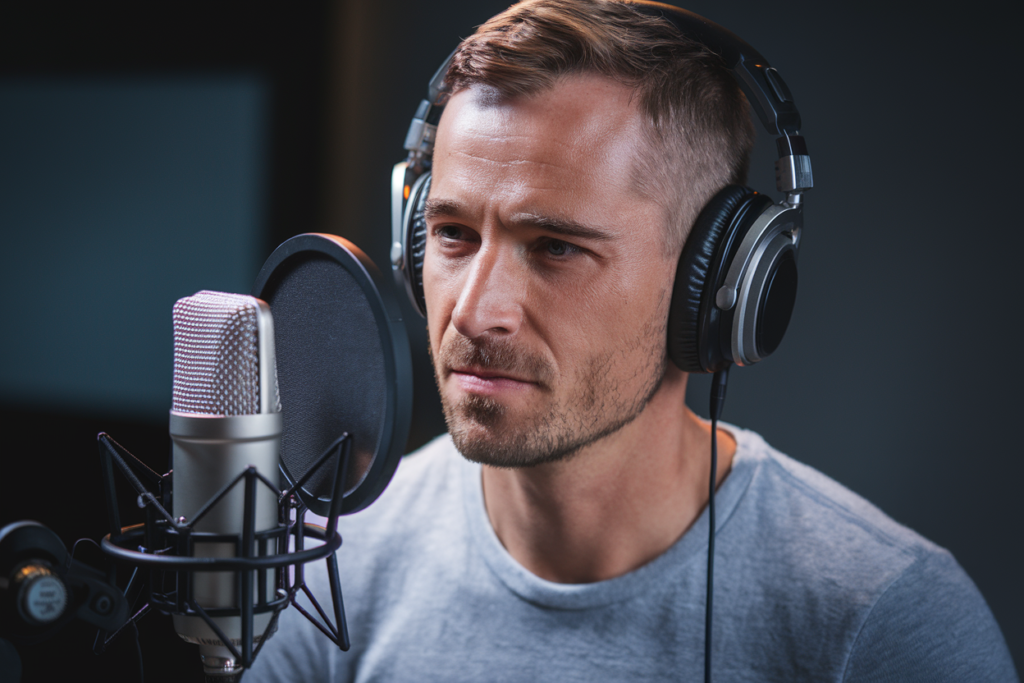Key Takeaways
- Cultural Awareness is Key: Successfully localizing French voiceovers requires an understanding of cultural references and regional dialects to ensure the content resonates with diverse audiences across France.
- Language Nuances Matter: Variations in vocabulary, slang, and pronunciation between regions can significantly impact the effectiveness of a voiceover. Choosing talent familiar with these differences enhances authenticity.
- Quality Production is Essential: High-quality audio recording and synchronization are crucial for delivering clear and engaging voiceovers. Professional studios and skilled engineers should be utilized to avoid technical issues that could distract from the message.
- Select Native Talent: Engaging native French voice actors who understand local nuances leads to more relatable performances that connect emotionally with listeners.
- Incorporate Local References: Infusing scripts with culturally relevant idioms or expressions helps maintain clarity while increasing engagement among the target audience.
- Collaborative Approach Works Best: Open communication between clients and voice talent fosters creative collaboration, ensuring that performances align with project intentions and resonate well with viewers.
Ever wondered why some French voiceovers just don’t resonate in France? Localizing French voiceovers for the French audience isn’t as simple as it seems. It’s a complex dance of culture, dialect, and nuance that can trip up even the most seasoned professionals.
Overview of French Voiceovers
French voiceovers play a crucial role in connecting with audiences across various media, from commercials to films and educational content. Understanding the nuances of the French language is essential for delivering an effective voiceover that resonates with listeners.
Localization isn’t just about translating words; it’s about capturing cultural references, idioms, and even regional dialects. For instance, a voice actor must adapt their delivery based on whether they’re targeting Parisian or regional audiences. This subtlety can significantly impact how a message is received.
Finding the right voice talent matters immensely. A skilled voice artist brings not only vocal quality but also emotional depth to projects. They help convey the intended message authentically, ensuring it aligns with local expectations and preferences.
When selecting a voice over artist, consider factors like tone and style. The right choice enhances the overall narrative while maintaining audience engagement. Each project demands unique qualities from its chosen voice over talent to connect effectively with its target demographic.
Navigating the complexities of French localization requires collaboration between clients and professional voice actors who understand these intricacies. By prioritizing cultural relevance and emotional resonance in your projects, you set up for success in reaching your intended audience.
Understanding Localization Challenges
Localizing French voiceovers for a French audience presents unique challenges. It’s not just about translation; it’s about capturing the essence of culture and language nuances.
Cultural Nuances
Cultural references play a significant role in effective localization. A voiceover that resonates with a Parisian viewer might not connect with someone from Marseille. You must consider local traditions, popular media, and even humor to ensure relevance. For instance, idiomatic expressions can vary widely across regions. Selecting a voice actor who understands these subtleties enhances authenticity and emotional impact, allowing your message to resonate deeply with the target audience.
Linguistic Variations
Linguistic differences also pose challenges during localization. French dialects vary significantly throughout France, affecting vocabulary and pronunciation. A skilled voice artist must navigate these variations to deliver an authentic performance that feels natural to listeners. If you’re targeting youth culture in urban areas, incorporating contemporary slang is vital for relatability. Engaging voice talent familiar with regional speech patterns ensures your project sounds genuine and appealing while maintaining clarity in communication.
Technical Hurdles
Localizing French voiceovers for a French audience involves several technical challenges that can impact the overall quality and effectiveness of the final product. Addressing these hurdles is crucial for achieving a polished and impactful result.
Audio Quality Issues
Audio quality plays a vital role in voiceover success. Poor recording conditions or inadequate equipment often lead to background noise, distortion, or inconsistent volume levels. These factors can distract listeners and undermine the message’s clarity. Ensuring high-quality audio requires professional recording studios, skilled engineers, and appropriate soundproofing techniques to capture crisp and clear voiceover performances. Voice actors must also be aware of their vocal delivery; variations in tone or pacing can affect how well the content resonates with your target audience.
Synchronization Problems
Synchronization issues frequently arise when adapting voiceovers to existing visuals or animations. Misalignment between audio and visual elements disrupts the viewer’s experience, leading to confusion or disinterest. Achieving perfect synchronization involves precise timing adjustments during post-production stages. Voice over talent should work closely with production teams to ensure that every word matches lip movements and scene transitions seamlessly. This collaboration ensures that viewers remain engaged while absorbing both audio and visual components without distraction.
Navigating these technical hurdles isn’t just about solving problems; it’s about enhancing the emotional connection between your content and its audience through effective localization strategies tailored for France’s diverse culture.
Case Studies
Localizing French voiceovers presents unique challenges and opportunities. Examining both successful and failed attempts can provide valuable insights.
Successful Localization Examples
One notable success involved a popular animated series tailored for a French audience. The team engaged native voice actors who fully understood the cultural references embedded in the script. By selecting voice talent with regional dialect expertise, they ensured that humor and emotion resonated authentically. This careful attention to detail transformed the series into a hit, captivating viewers across France.
Another example highlights an educational platform that localized its content. They worked closely with experienced voice artists familiar with current slang and trends among young audiences. This approach not only enhanced relatability but also fostered engagement, leading to increased user retention rates.
Failed Localization Attempts
Conversely, some localization efforts fall short due to missteps in understanding cultural nuances. A tech company once launched an ad campaign using a generic voice over actor without considering local dialects or expressions. As a result, the message felt flat and disconnected from the intended audience, leading to poor reception in key markets.
In another instance, a film aimed at French teens used outdated slang in its voiceovers. The choice of language alienated younger viewers who found it unrelatable. Such oversights highlight how crucial it is to prioritize authentic representation when selecting voiceover talent for localization projects.
Navigating the intricacies of localizing French voiceovers requires awareness of these successes and failures. By learning from both ends of the spectrum, you can make informed decisions that enhance your project’s impact on your target audience.
Best Practices for Localization
When localizing French voiceovers, several best practices can enhance the effectiveness and relevance of your project. Focusing on these elements ensures that your content resonates with a French audience.
- Select Native Voice Talent
Choosing native voice talent is crucial. A voice actor who understands cultural nuances and regional dialects brings authenticity to the performance. This familiarity allows them to convey emotion and intent effectively, which strengthens connection with listeners.
- Understand Regional Variations
Recognize the linguistic diversity across France. Different regions have unique expressions, accents, and slang. If your content targets specific areas, engage a voice artist from that region to ensure the dialogue feels relatable.
- Incorporate Cultural References
Infusing relevant cultural references into your script is vital for engagement. A skilled voice over artist can adapt phrases or idioms that resonate with local audiences while maintaining clarity in communication.
- Utilize Professional Recording Facilities
Invest in high-quality recording environments to capture clear audio without distractions or technical hiccups. Working with experienced engineers ensures optimal sound quality and synchronization during post-production.
- Prioritize Emotional Resonance
Aim for emotional depth in performances by allowing your voice actors to embody characters fully. When they connect personally with the material, it translates into more compelling narratives that draw in listeners.
- Collaborate Closely With Your Voice Talent
Maintain open lines of communication with your voice actors throughout the process. Discuss intentions behind scripts, encourage feedback, and refine performances based on collaborative insights to achieve stronger results.
By applying these best practices when localizing French voiceovers, you create authentic experiences tailored specifically for your target audience—ensuring every word not only sounds right but feels right too.
Conclusion
Navigating the complexities of localizing French voiceovers for a French audience isn’t easy. It requires a keen understanding of cultural nuances and regional dialects to create an authentic experience. Selecting the right voice talent is crucial as they bring emotional depth and cultural relevance to the project.
By recognizing these challenges and implementing best practices, you can significantly enhance your localization efforts. Prioritizing collaboration with skilled voice artists will ensure your message resonates with diverse audiences across France. Striving for authenticity in every aspect not only elevates your content but also fosters deeper connections with viewers, making all the difference in successful localization projects.
Frequently Asked Questions
What are the main challenges of localizing French voiceovers?
Localization of French voiceovers involves navigating cultural references, dialects, and nuances. Different regions in France have unique speech patterns and slang that can affect how a message is received. Understanding these variations ensures the voiceover resonates with the intended audience.
Why is selecting the right voice talent important for localization?
Choosing skilled voice talent is crucial because they can convey emotional depth and authenticity. A native speaker familiar with regional dialects will deliver a performance that aligns with local expectations, enhancing relatability and engagement for the target audience.
How do cultural references impact French localization?
Cultural references play a significant role in making content relatable to a specific audience. If a voiceover includes relevant idioms or current slang understood by locals, it creates stronger connections. Ignoring these elements can lead to disconnection from viewers.
What technical issues should be considered in localization projects?
Technical challenges include audio quality, synchronization, and timing adjustments during post-production. Using professional recording studios and skilled engineers helps ensure high-quality audio that aligns perfectly with visual elements, preventing distractions in the final product.
Can you provide examples of successful localization efforts?
Successful examples include animated series utilizing native voice actors who understand cultural contexts or educational platforms engaging artists familiar with modern slang. These approaches enhance relatability and user engagement by ensuring authenticity in performances.
What lessons can be learned from failed localization attempts?
Failed attempts often stem from using generic voice actors or outdated slang that alienates target audiences. These cases highlight the necessity of authentic representation and understanding regional nuances to prevent disconnecting messages from viewers’ realities.
What best practices should be followed for effective localization?
Best practices include selecting native voice talent knowledgeable about cultural nuances, incorporating relevant references into scripts, using professional facilities for high audio quality, and collaborating closely with voice actors throughout the process to refine performances effectively.







